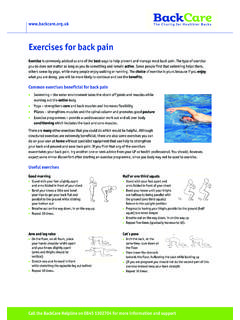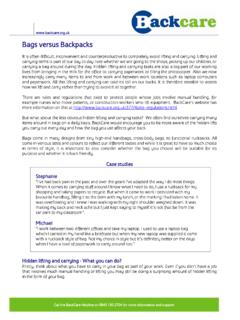Transcription of THE GOOD-NIGHT - Home - The Sleep Council
1 Is yourchild s bedfit for Sleep ?THEGOOD-NIGHTTHEGOOD-NIGHTGUIDE FORCHILDREN2 Sleep is extremely important to support children s development both physically and mentally. Establishing good Sleep patterns can help children to meet their full potential. This short guide for parents and carers will develop awareness of the importance of Sleep and offer advice around what to do to prevent Sleep issues occurring. It is also packed full of tips on how to manage Sleep issues that may arise. READ ON TO FIND OUT MORE ABOUT:* The importance of Sleep * Sleep cycles * How much Sleep is needed* good Sleep routines* Common Sleep problems* Night terrors and nightmares* Teenagers and Sleep * Creating a calm bedroom* Choosing an appropriate bed* Useful resourcesTh isGuide isabout..3 THE IMPORTANCE OF SLEEPS leep is essential to support children s development. Well rested children are more able to meet their full potential in every aspect of their lives.
2 Listed below are just a few of the symptoms of Sleep deprivation in children:* Growth or hormone issues* Concentration difficulties* Mental health issues* Lowering of the immune system* Hyperactivity* Weight gain* Behavioural issues* Difficulty remembering thingsParents who are disturbed by their child s poor Sleep patterns are also likely to suffer from Sleep deprivation. A well-rested household usually makes for a happier CYCLESAt night time we experience different levels of Sleep and we Sleep in cycles. REM and Non-REM Sleep are different stages but both essential to keep us healthy. The diagram shows an example of how these cycles occur. We get our deep Sleep towards the beginning of the night and our lighter Sleep in the early hours of the morning. After each Sleep cycle (usually around 90 minutes, though less in infants) we come to a point of partial awakening.
3 If everything is as it was when we fell asleep then we may just roll over and carry on sleeping. If anything has changed that s when we wake up! This is why it is important that a child s Sleep conditions remain the same through the night. A child who needs rocking to Sleep is highly likely to wake up after each Sleep cycle and need a parent to rock them back to Sleep . Likewise a child who has learned to fall asleep watching a lullaby show is likely to need this condition back in place to be able to nod back STAGES OF Sleep ARE AS FOLLOWS:* Non-REM SleepStage 1 a very light Sleep , where your child will be easily woken. If you ve ever tried tip toeing out of their bedroom and they ve woken up then this is why they were in a very light 2 still quite a light Sleep but the body is preparing for the deep Sleep that is about to come. Your child will be more relaxed now and if you are trying to sneak out of their bedroom then this is a good time to make your exit!
4 Stage 3 this is a very deep Sleep . The body needs this Sleep so that repair can take place. Your child will be difficult to wake when they are in this stage.* REM Sleep REM Sleep , or rapid eye movement Sleep as you may hear it referred to, is when dreams occur. It is vital for mental and emotional development. Our brains can become very active during REM Sleep yet our bodies are RHYTHM what it is and what it doesWe all have an internal body clock, sometimes referred to as a circadian rhythm. Our body clocks take their cue from light and dark, which can be confusing for some children when in winter we spend much of our time in darkness. It is important that we strengthen our children s body clocks so that they develop a regular Sleep and wake up time. Putting them to bed at the same time each night will help, as will waking them at the same time each morning even at the weekend!
5 Sometimes children s body clocks can go off track, for example when changing the clocks from winter time to summer time. If bedtime has crept backwards you need to gradually reset your child s body clock by bringing it forwards by 15 minutes every three nights until you reach the desired time. MELATONINM elatonin is a hormone that occurs naturally in our bodies when it gets dark. It is produced at night time to help us go to Sleep . This is why it is a good idea to put your child to bed in a dark environment and to dim the lights in the run up to bedtime. Melatonin production is interfered with by screen activities for example watching television or playing on a computer. The light from the screens will stop the melatonin being produced as effectively therefore it is best to avoid these activities in the hour leading up to bedtime. Some children, particularly those on the autistic spectrum, are prescribed melatonin to help with their Sleep issues.
6 good Sleep hygiene should still be maintained as the melatonin will not work as effectively if your child is not comfortable, relaxed and in an appropriate bedroom environment. 6 HOW MUCH Sleep IS NEEDED? Sleep needs change as children get older. Most three year olds will need around 12 hours of Sleep and will be starting to drop their daytime nap. Naps in the daytime do help pre-school children to avoid becoming over-tired. Ironically an over-tired toddler is harder to get to Sleep than a well-rested youngster. Naps in pre-school children should be encouraged and scheduled so that they aren t too close to around the age of four to six years old need between and hours of Sleep on average. And as they move through school they are likely to need around 10 hours each night. Teenagers Sleep needs will be addressed later in the guide - they need around eight to nine hours but often get much less than this.
7 It s important to remember if your child sleeps less or more than the average it s not always an issue! good Sleep ROUTINESE verybody can benefit from having a good Sleep routine even grown-ups! A good Sleep routine needs to be planned well in advance. Consistency and firmness are also key. Firstly you need to consider what time bedtime will be and then work backwards, planning the hour leading up to it in some detail. If your child isn t settling until late you may need to gradually move their bedtime as previously described, the routine will need to be gradually moved are some tips for devising the ideal bedtime routine:* Make sure bedtime is realistic, if your child isn t falling asleep until 11pm there is no point starting a routine at 6pm* Turn all screens off in the hour before bedtime* Dim the lights, close the curtains if needs be and create some darkness to help to promote the melatonin ( Sleep hormone) production* Offer quiet activities that are motivating to your child.
8 Fine motor skill activities are perfect to aid relaxation eg jigsaws, colouring in, threading, building with bricks etc.* Consider introducing supper time. Slow releasing carbohydrates are great for keeping little tummies full. Dairy products are also very calming at night time. Avoid anything sugar loaded or containing caffeine* Baths are great if your child finds them relaxing. If however they are fearful of them or get over-excited they may not help in the bedtime routine. Ideally a bath should take place 30 minutes before bedtime as this aids relaxation by increasing the body temperature. It is the slow decrease in body temperature that helps us to feel more relaxed and nod off more easily* Get ready for bed in the same order - for example, pyjamas on, tooth brushing, toilet* Once in bed spend some time reading a bedtime story with your child* Give hugs and kisses and tell your child it s night time, go to Sleep * Wake them up at the same time each morning to help to strengthen their body clock8 COMMON Sleep PROBLEMS* Self-settlingThe biggest difficulty is often that children can t settle themselves to Sleep at the start of the night.
9 Some children need a parent in bed with them or rocked in a pushchair or even driving around in a car to be able to fall asleep. Once they come up through the Sleep cycle to a point of a partial awakening and they find the conditions have changed they need attention. Teaching children to soothe themselves to Sleep can be done gently and gradually. * Changes in RoutineWhen routine is changed it can impact on Sleep issues. Christmas for example is a wonderful time of the year but in January many families are still struggling to get their children to Sleep . Sticking to routine as much as possible is helpful and will ensure your child feels secure.* Feeling Hungry or ThirstyAdding in a supper time can help with the hunger pangs at night. If a child is thirsty then offer them water. Diet is important and what is consumed during the day can impact on Sleep .
10 It is best to avoid anything sugar loaded during the evening such as biscuits and cakes. Caffeine is a stimulant so tea, coffee, cola and even hot chocolate are best avoided in the run up to bedtime. good choices are anything calcium based such as yoghurt, fromage frais or a glass of milk. Porridge is a great supper time snack or even a banana smoothie. * DiscomfortThe bed needs to have a supportive mattress. This is particularly important for growing children. An unsupportive bed can result in aches and pains leading to problems in adulthood. According to BackCare, youngsters need a supportive bed as much as, if not more than an adult. Their research found that an increasing number of teens and even younger children are suffering back children may be uncomfortable due to medical conditions for example children with eczema may find it hard to get comfortable at night time.


